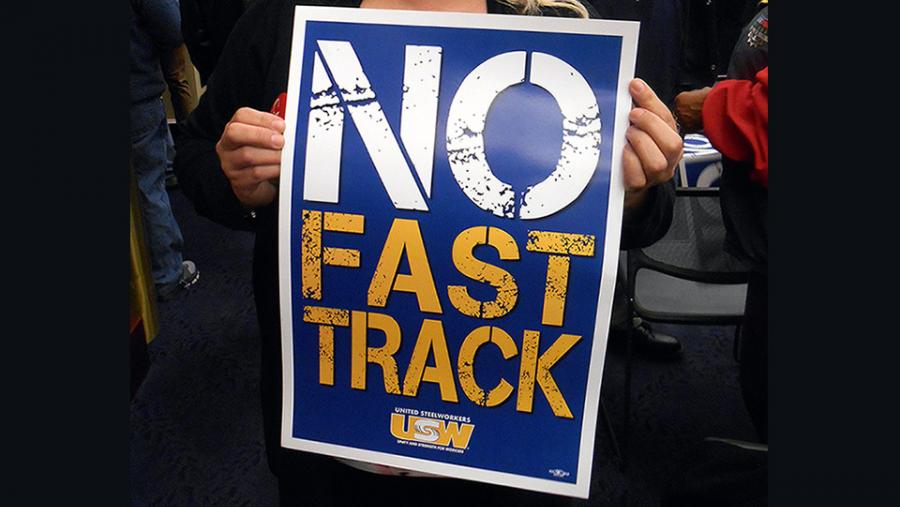Submitted by PR Watch Admin on

-- by John Nichols, The Nation
House Ways and Means Committee chairman Paul Ryan has been working feverishly this week to secure support for Trade Promotional Authority, under which Congress would grant to President Obama so-called “fast-track” authority to close the deal on sweeping new trade agreements such as the Trans-Pacific Partnership. Ryan’s enthusiastic lobbying has provided essential backing for Obama’s effort to get Congress to cede its oversight and amendment powers over trade deals, as Ryan has gone out of his way to round up Republican support for the demand of a Democratic president who has not been able to get many Democrats to back his fast-track demand.
President Obama has needed allies such as Ryan as the House has prepared to vote on whether to join the Senate in supporting a surrender of congressional input and oversight on the sweeping TPP scheme. (Trade Promotion Authority requires a straight up-or-down vote on a negotiated trade agreement, with no amendments and limited debate.)
The president has not been able to look to his usual allies in the labor movement. Unions are overwhelmingly opposed to a deal that Communications Workers of America posters refer to as “NAFTA on Steroids.”
The president has not been able look to major environmental organizations. The Sierra Club, Friends of the Earth and other green groups are outspoken in their opposition.
The president can’t look to progressive farm groups. The National Farmers Union is explicitly opposed to using a fast-track approach that would allow trade agreements to move through Congress with limited debate and no amendments.
In fact, as Obama has ramped up his advocacy for a free-trade strategy that progressive Americans tend to see as a threat to workers, farmers, the environment, human rights and democracy, he has acknowledged that he has not been able to count on traditional allies to stir up grassroots support in the states. That’s one of the reasons why there has been so much uncertainty about whether he will get fast-track authority.
As the president has gone all in for the TPP, he has found himself in strange company—aligning with groups that promote policies that activists say contribute to the growing gap between a wealthy few and an increasingly impoverished many.
There is, for instance, one group that has maintained an extensive network of political connections in states across the country and is enthusiastically on board for “the expedited conclusions and approval of the TPP.”
That group is the American Legislative Exchange Council.
ALEC, the corporate-funded organization that stirred considerable controversy several years ago with its advocacy on behalf of so-called “Stand Your Ground” gun laws and restrictive “Voter ID” rules, produces so-called “model legislation” and resolutions for introduction by conservative state legislators. In 2013, the ALEC board of directors approved and circulated a “Model Policy” that celebrates the TPP and declares that it “will be an impetus for further bilateral and multilateral trade agreements…”
Expanding trade along lines established by the North American Free Trade Agreement and the permanent normalization of trade relations with China has always been on ALEC’s agenda. The multinational corporations that cover the group’s expenses, and help to define every aspect of its agenda, embrace an approach that allows them to move factories and jobs from country-to-country in order to lower wages and avoid labor, environmental and human rights regulations.
ALEC’s model policy on the TPP even makes respectful reference to President Obama and his administration. That’s ironic, as ALEC members have been among the most ardent critics of the president’s policies. Not long ago, the group published a “State Legislators Guide to Repealing Obamacare.” Yet, ALEC has highlighted the Obama administration’s support of the TPP “as one-part of its strategy to increase competitiveness and employment in the United States…”
Over the past year, ALEC has urged state legislators who have been busy trying to block implementation of the Affordable Care Act to get their states to formally endorse the TPP. The model policy concludes:
"NOW THEREFORE, BE IT RESOLVED that the legislature of [INSERT STATE] call(s) on Congress to support negotiations for a comprehensive, high-standard and ambitious Trans-Pacific Partnership Agreement that will provide a platform for regional trade and economic integration."
ALEC’s International Relations Task Force, which is co-chaired by a representative from Philip Morris International, declares on its webpage that it “promotes both bilateral and multilateral free trade frameworks, initiatives and partnerships.” ALEC has a long history of being at the forefront of fights to sell the trade agenda outlined in the North American Free Trade Agreement and other deals backed by Democratic and Republican presidents.
Indeed, the task force that’s promoting the TPP says, ALEC’s international policy work is persuasive “precisely because our policy directives are backed by our public and private sector members—American state legislators from all 50 states and some of the world’s largest corporations.”
